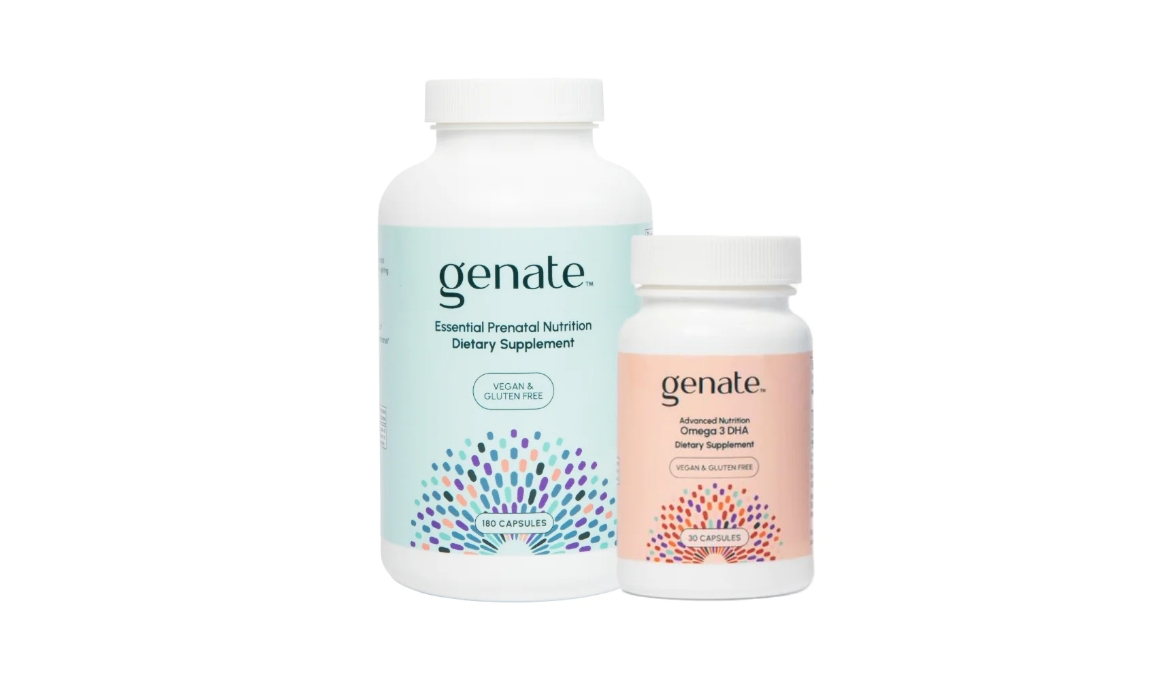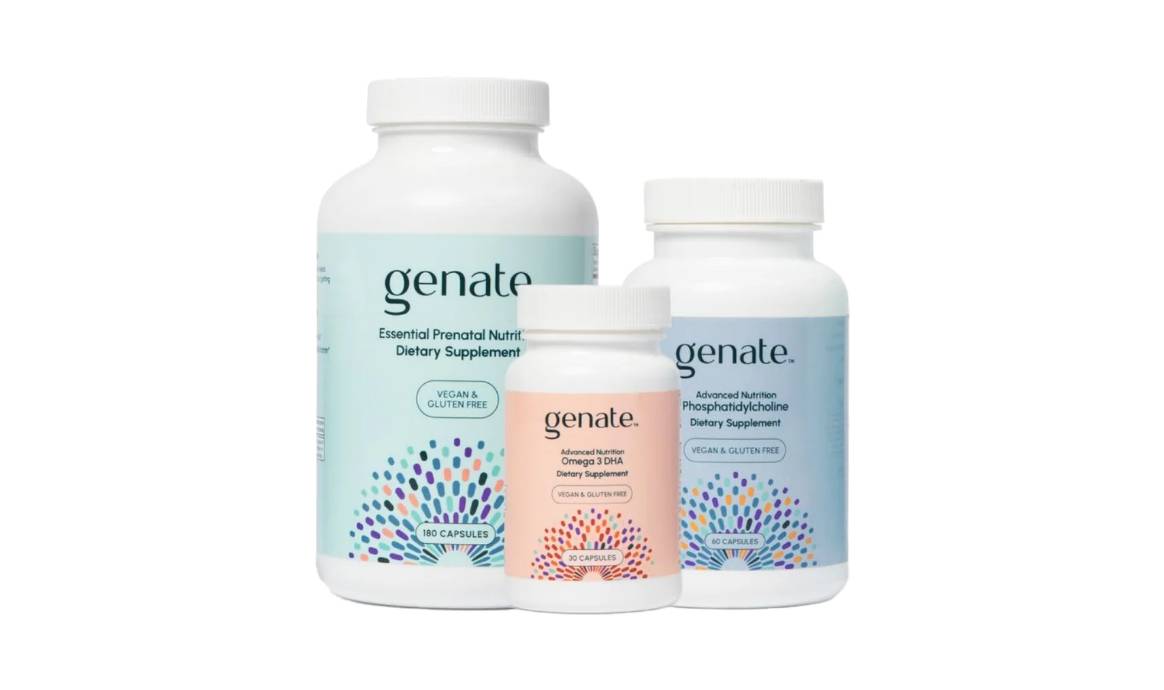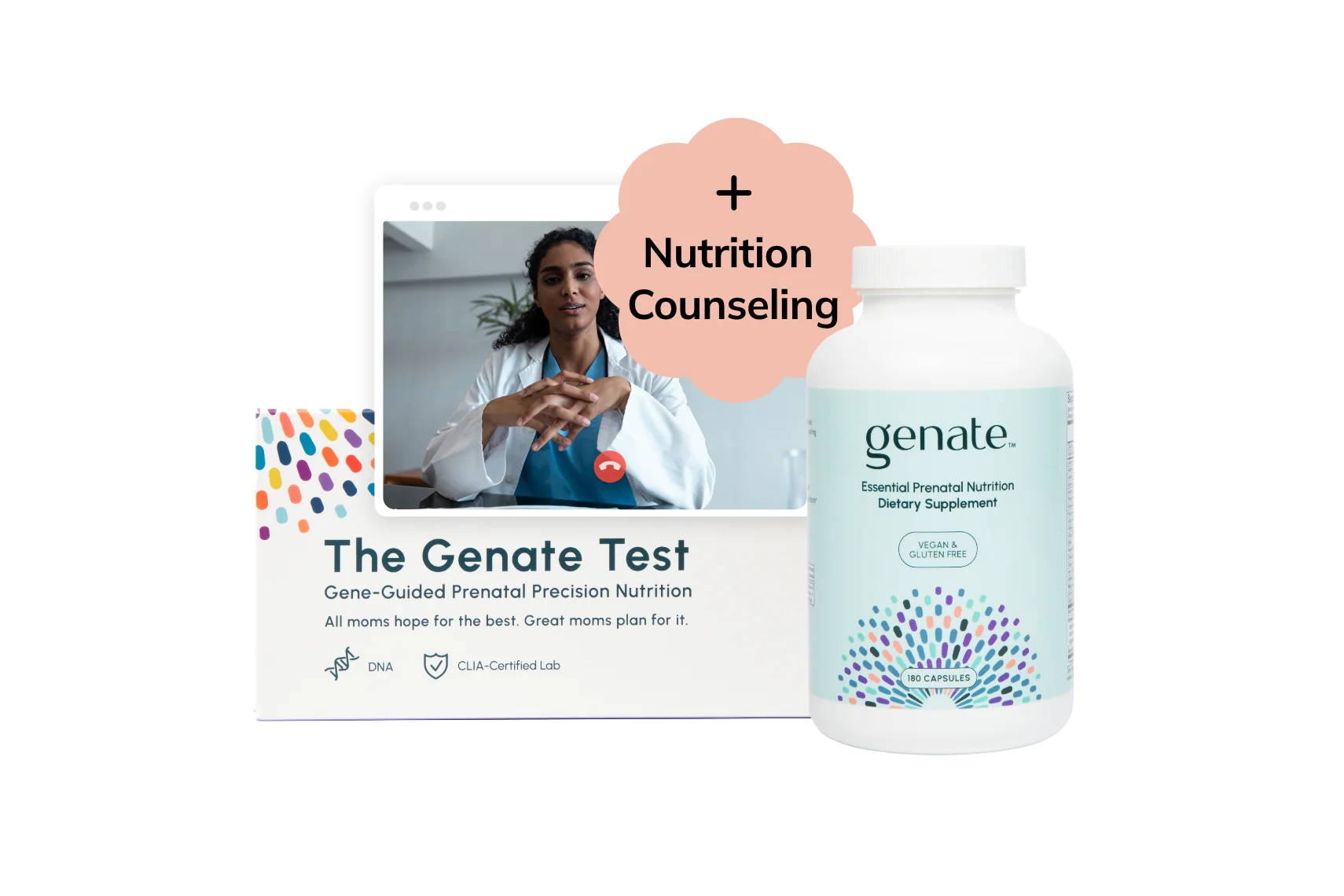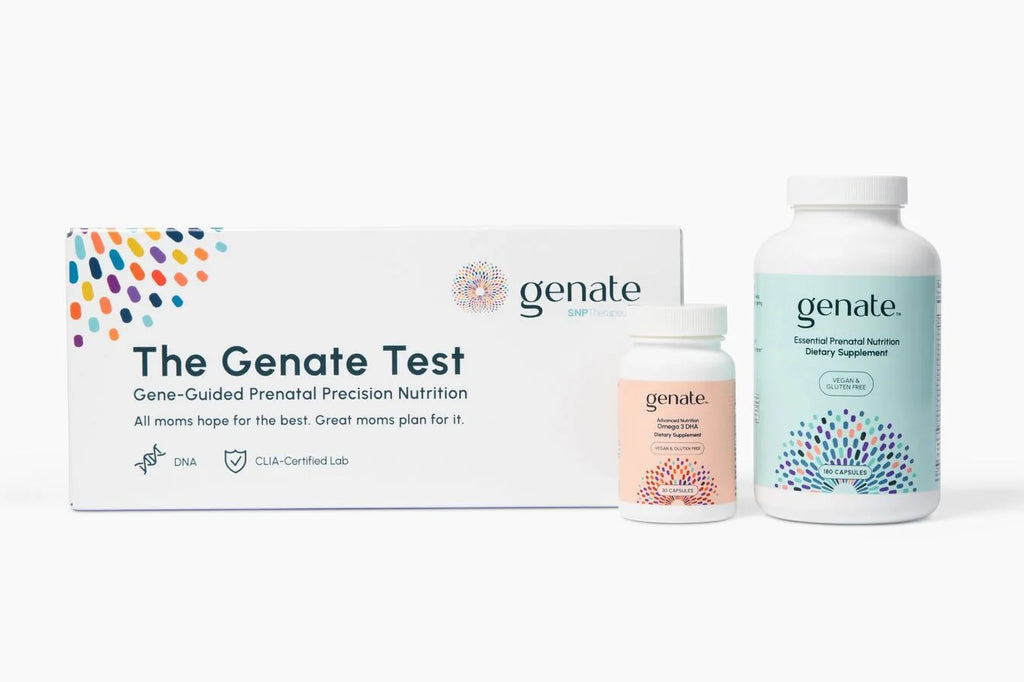Good nutrition is essential for every stage of your baby’s growth and development. But the efficiency with which your body metabolizes nutrients is partly determined by your genes, and common genetic variants can affect the metabolism of one-carbon nutrients that are critical for the development of your child’s brain and spinal cord. Genate Essential Prenatal Nutrition is a multivitamin formulated from academic research that provides women with a formulation optimized to support their baby’s cognitive development. It includes the one-carbon nutrients choline, betaine, methylfolate, and B vitamins that many women have trouble metabolizing and/or don’t get enough of in their diet.

DIET & NUTRITION
What Your Pregnancy Diet Should Consist of - A Prenatal Nutrition Guide
by Genate • June 6, 2023 • 6-8 minute read
Nutrition during pregnancy is important for helping your baby grow and develop appropriately. You should eat a balanced diet with lean meats, whole grains, fruits, vegetables, and dairy while limiting added sugar, high-sodium foods, and saturated fats. Some important nutrients to get during pregnancy includes carbohydrates, protein, Vitamins A, C, E, and D, iron, calcium, magnesium, zinc, and omega-3 fatty acids.
Other essential nutrients for pregnancy, called 1-carbon nutrients, include folate, vitamins B6 and B12, and choline. Below shows why these nutrients are important for you and your baby, what food sources these nutrients come from, and how much of these nutrients you should be getting each day.
What Are Some Essential Nutrients Needed for Pregnancy?
Carbohydrates
Your body uses carbohydrates as fuel. When you eat carbohydrates, your body breaks them down into glucose, which goes into your placenta to help your baby grow and develop.[18] The amount of carbohydrates needed can vary with each person, but you should get about 175 to 210 grams of carbohydrates each day.[19] This may change if you have been diagnosed with Gestational Diabetes. If you have Gestational Diabetes, a Registered Dietitian can help with finding the right amount of carbohydrates for your body. Carbohydrate foods include cereals, breads, pastas, potatoes, fruits and crackers.[18]
Discover the genetics that affect your baby's cognitive development
Protein
Protein is an important part of prenatal nutrition, it will help your body make cells for your baby to allow for growth and development of their organs, especially the brain. It will also help your baby’s immune system by forming their DNA. Protein helps your body produce collagen, which helps your uterus grow appropriately for your baby. Some studies have shown that getting the right amount of protein may decrease your risk for swelling later in your pregnancy. Protein also helps with your blood sugar and keeps you fuller longer. Protein needs can vary by weight and activity, so it’s important to speak to a Registered Dietitian if you have any questions. [16] In general, it’s recommended to eat 75 to 100 grams of protein each day. Protein is found in meat, poultry, seafood, eggs, cheese, milk, yogurt and legumes. [17]
Folic Acid
Iron
When you’re pregnant, you have extra blood in your system to support you and your baby. Iron is important to make the extra blood you need and ensure your baby gets oxygen to their red blood cells. If you have iron deficiency, your baby is at risk of being born prematurely, with low birth weight, low iron, or decreased cognitive development.3 Lean meat and seafood are richer sources of iron; however, other sources include beans, green leafy vegetables, lentils, and fortified bread and cereals.[4] You should be getting 27 milligrams of iron each day.[3]
Vitamin C
Vitamin C is a key part of nutrition during pregnancy, as it helps develop your baby’s gums, teeth, and bones; in addition, it has antioxidant properties and supports your immune system. Vitamin C will also help you absorb plant-based sources of iron. The best sources of vitamin C come from fruits and vegetables. Some examples include peppers, oranges, grapefruit juice, broccoli, potatoes, strawberries, and cantaloupe.[5] You should be getting 85 milligrams each day.[3]
Vitamin D
Vitamin D helps develop your baby’s bones and teeth as well as make sure they have healthy skin and eyes. It also helps your body absorb calcium.[6] Vitamin D is primarily from sunlight but is also in food sources like fortified milk, salmon, sardines, fortified cereals, and egg yolks. You should be aiming for 600 international units each day.[3]
Calcium
Calcium is important for building your baby’s bones and teeth. Most of the calcium in your body is in your bones and teeth. Food sources such as milk, yogurt, and cheese are rich in calcium. If you don’t eat dairy, you can still get some calcium from food like dark leafy greens, salmon with bones, sardines, tofu, fortified juice, and cereals. You should be getting about 1000 milligrams of calcium per day. [7]
Vitamin A
Vitamin A is important for your baby’s skin, eyes, and bones to develop. In addition, it’s also important for your immune system and to keep your organs healthy. It is found in green leafy vegetables, orange foods like carrots and sweet potatoes, dairy products, liver, fish, and eggs.[8] You should be getting 770 micrograms each day.[3]
Vitamin E
Vitamin E is another vitamin with antioxidant properties and supports your immune system. It helps make red blood cells and muscle tissue for your baby.[9] Vitamin E is found in vegetable oils, sunflower seeds, tree nuts, green leafy vegetables, and fortified cereals. You should be getting 15 milligrams of vitamin E daily.[10]
Supplement | Sources | Amount Needed Each Day |
Carbohydrates | Cereals, Breads, Pastas, Potatoes, Fruit, Crackers | 175-210 gm* |
Protein | Meat, Poultry, Seafood, Eggs, Cheese, Milk, Yogurt, Legumes | 75-100 gm** |
Folic Acid | Fortified cereals, Breads, Pastas, Green leafy vegetables, Seafood, Eggs, Nuts, Beans, Fruit, Fruit Juice | 600 mcg |
Iron | Lean meat, Seafood, Beans, Green leafy vegetables, Lentils, Fortified breads & cereals | 27 mg |
Vitamin C | Peppers, Oranges, Grapefruit juice, Broccoli, Potatoes, Strawberries, Cantaloupe | 85 mg |
Vitamin D | Fortified milk, Salmon, Sardines, Fortified cereals, Egg yolks | 600 IU |
Calcium | Milk, Yogurt, Cheese, Dark leafy greens, Salmon w/ bones, Sardines, Tofu, Fortified juice, Cereals | 1000 mg |
Vitamin A | Green leafy vegetables, Carrots, Sweet potatoes, Dairy products, Liver, Fish, Eggs | 770 mcg |
Vitamin E | Vegetable oils, Sunflower seeds, Tree nuts, Green leafy vegetables, Fortified cereals | 15 mg |
Iodine | Seaweed, Iodized salt, Seafood, Dairy, Eggs, Enriched breads | 220 mcg |
Vitamin B6 | Fish, Beef liver, Chickpeas, Starchy vegetables, Fortified cereals | 1.9 mg |
Vitamin B12 | Beef liver, Milk, Beef, Salmon, Fortified cereals, Cheese, Strawberries, Bananas | 2.6 mcg |
Magnesium | Green leafy vegetables, Legumes, Dairy, Whole Grains, Seeds, Nuts | 350-400 mg |
Zinc | Meat, Seafood, Poultry, Eggs, Dairy, Beans, Nuts, Whole grains | 11 mg |
Choline | Meat, Beef Liver, Eggs, Dairy, Fish, Poultry, Beans, Nuts, Seeds, Whole grains | 450 mg |
Omega-3 Fatty Acids | Salmon, Sardines, Shrimp, Flaxseed, Chia seeds, Canola oil, Walnuts, Beans, Eggs | 8-12 oz 2x/week |
*Varies based on weight, activity levels and if you have gestational diabetes. | ||
**Varies based on weight and activity levels | ||
What Are Other Nutrients to Include in Your Prenatal Nutrition Plan?
Iodine
Iodine is important for developing your baby’s brain and helps prevent intellectual disabilities. It’s also important for the regulation of your thyroid hormone.3 Previous studies have shown that pregnant women do not consume enough iodine sources, putting them at risk for iodine deficiency. If you are iodine deficient, adverse effects are not able to be reversed. Some of these risks include developmental deficits, low growth, miscarriage, and stillbirth. Seaweed has very high amounts of iodine. Other food sources are iodized salt, seafood, dairy, eggs, and enriched bread.[11] You should be getting 220 micrograms of iodine each day.[3]
Vitamin B6
Vitamin B6 helps make your baby’s red blood cells, helps you use energy from carbohydrates, protein, and fat and may help with nausea and vomiting during pregnancy. It’s also important to support your cognitive development and your immune system. Food sources with vitamin B6 include fish, beef liver, chickpeas, starchy vegetables, and fortified cereals. You should be getting 1.9 milligrams each day.[12]
Vitamin B12
Vitamin B12 also helps create your baby’s red blood cells, helps their nervous system to function properly, and helps their DNA form. Vitamin B12 is also important to support your central nervous system. Foods include beef liver, milk, beef, salmon, fortified cereal, cheese, strawberries, and bananas. You should be getting 2.6 micrograms each day. [13]
Magnesium
A recent study has shown that magnesium supplementation may prevent complications in your pregnancy and may prevent intrauterine growth restriction. The same study also showed that it might help prevent preeclampsia.[21] Magnesium helps maintain your muscles, nerves, blood sugar and blood pressure. It is best to get most of your magnesium from food sources instead of supplements, as too much from supplements may cause diarrhea. Magnesium is found in green leafy vegetables, legumes, dairy, whole grains, seeds and nuts. You should be getting 350 to 400 milligrams of magnesium each day.[20]
Zinc
Zinc helps your baby grow and develop and may help prevent a low birth weight. [22] It also builds DNA and produces new cells for your growing baby. [23] Zinc may also help prevent preeclampsia. Zinc is rich in meat, seafood and poultry. It is also in eggs, dairy, beans, nuts and whole grains. If you are a vegetarian, you may have a lower intake of zinc as you aren’t eating meat. You should be getting 11 milligrams of zinc daily.[22]
Choline
Choline also helps your baby’s brain and spine development, as well as helps prevent birth defects. Choline supports your brain for muscle control, memory and mood as well.[14] Oftentimes, there isn’t enough choline in prenatal vitamins, so it’s important to have a varied diet. Choline is in many foods and is found in meat, beef liver, eggs, dairy, fish, poultry, beans, nuts, seeds, and whole grain foods. [14] You should be getting 450 milligrams each day.[3]
If you’re interested in using your genetics to personalize your nutrition during pregnancy, read more about why you should screen before choosing a prenatal.
Omega-3 Fatty Acids
Omega-3 fatty acids are made up of many compounds, the most researched being alpha-linolenic acid (ALA), eicosapentaenoic acid (EPA), and docosahexaenoic acid (DHA). Overall, omega-3 fatty acids are an important nutrient for pregnant women and one to ensure you get enough of; however, DHA is very important to help your baby’s brain development and for your baby to grow properly. DHA also helps make other compounds in your body that support your immune system, endocrine system, and much more.
Some studies have shown that getting a combination of DHA & EPA supplement of fish oil had heavier babies at birth and fewer preterm deliveries. DHA food sources include fatty fish like salmon, sardines, and shrimp. Other omega-3 food sources include flaxseed, chia seeds, canola oil, walnuts, beans, and eggs.[15] You should be eating two servings of 8-12 ounces two times each week.[3]
Best Foods for Prenatal Nutrition
As seen above, many nutrients are important to help your baby grow and develop. The table below summarizes where the nutrients are found and how much you need. The nutrients you need to support your baby’s growth increase from when you aren’t pregnant. Nutrition for pregnant women is highly important, and often it’s hard to get all these nutrients through food, so a prenatal supplement may be beneficial. Prenatal vitamins can vary in nutrients, and some may even make you nauseous. Be sure you talk to your provider about taking a prenatal supplement that will work for you and incorporating the right pregnancy foods into your diet. Get the Genate Test to determine if you have any nutritional deficiencies, and discuss the best pregnancy diet with your healthcare provider or nutritionist.
This article is not intended as medical advice to treat or diagnose any health condition but rather as educational health information for the general public. It should not be used as a substitute for individualized medical care from your healthcare provider.
Shop the Article
Save 23% today!
Genate Essential Prenatal Multivitamin + Advanced Omega-3 DHA Package
Bundle to increase savings and provide the foundational nutrients needed for optimal health and development.
From $72 per month
Save 23% today!
Comprehensive Prenatal Support Package
Genate Essential Prenatal Multivitamin + Advanced Omega-3 DHA + Phosphatidylcholine
Our most comprehensive bundle - you’ll receive our Essential Prenatal Multivitamin, Advanced Phosphatidylcholine, and Advanced Omega-3 DHA.
From $110 per month
Save 30% today!
Comprehensive Prenatal Nutrition Bundle
Buy the Genate Test and a nutrition counseling session with a Genate registered dietitian, and receive a 30-day supply of the Genate Essential Prenatal Multivitamin FREE. Purchase includes a 90-day prenatal multivitamin subscription at our best monthly price.
$309
References
Take the Genate Quiz
Take our Nutrition Quiz to learn more about your nutrition journey.
Read Our Latest Articles
Frequently Asked Questions
What are the benefits of my baby getting the proper nutrients?
What are one-carbon nutrients and fatty acids, and why are they important?
One-carbon nutrients and fatty acids are critical for brain and spinal cord development during pregnancy and through the first two years of life. Although all nutrients are important, the one-carbon nutrients choline, folate, betaine, and B vitamins, along with the omega-3 fat DHA, provide the building blocks for proper growth of your developing baby's brain. Research at Cornell and Harvard universities has shown cognitive benefits for children born to mothers who received increased levels of one-carbon nutrients during pregnancy, demonstrating that optimal nutrition during pregnancy can have lasting effects for your baby.
If I buy Genate nutrition supplements, do I still need to take the test?
Genetic testing is a personal choice, and only you can decide what’s best for you and your baby. But the Genate Test is a powerful tool for optimizing your nutrition status, as it identifies genetically-caused metabolic inefficiencies that may influence your body’ ability to make and use the nutrients critical for your baby’s cognitive development. If you have SNPs in any of the nutrient pathways tested, your Genate Report will provide personalized recommendations for optimizing your nutrition. Our registered dietitians can show you how to fill in the gaps with foods and supplementation, if needed, to make sure you’re getting the nutrition you and your baby need.








